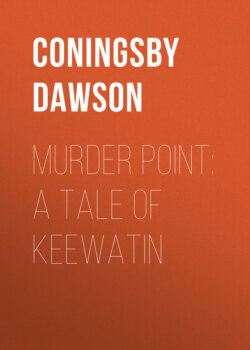Читать книгу Murder Point: A Tale of Keewatin - Coningsby Dawson - Страница 9
На сайте Литреса книга снята с продажи.
THE DEVIL IN THE KLONDIKE
ОглавлениеTable of Contents
Spurling, having returned from feeding his dogs, had reseated himself by the window, but he had not again spoken. When Granger had informed him that a meal was ready, and had called to him to come and partake, he had only shaken his head. When, however, it had been brought to him, he had eaten hungrily, bolting his food like a famished husky, yet never looking at what he ate, for his eyes were directed along the river-bed. He used neither fork nor spoon, carrying whatever was set before him hastily to his mouth in his hands. His whole attitude was one of hurry; he rested in haste, as if begrudging the moments which were lost from travel.
Had he been the foremost runner in some great race, who had fallen at the last lap, and, waiting to recover himself before making the final dash toward the tape, watched anxiously lest his next rival should round the bend, and surprise him before he was up on his feet again, he could not have been more tensely excited. His breath came in gasps and spasms; his body jerked and trembled even while he sat. He began to do things, and did not finish them. He opened his mouth to speak, and was silent. He half rose to his feet, and fell back again. He turned his head to look at Granger, then thought better of it, and continued staring into the west. Granger watched him, and wondered what might be the secret which he was hesitating to impart. Was his mind a blank through weariness? Was he arguing out some dreadful problem within himself? Or was he only mad?
What frail and isolated creatures we are!—when once our power of communicating thought is gone, though we breathe and move above the earth, we are more distant one from another than if we were truly dead; for, when a soul has totally forsaken its body, and the body has ceased to express, we, who live, can at least imagine that the thing departed sometimes returns and hovers within ourselves. To live and be silent is a remoter banishment from Life than the irrevocable exile decreed by Death.
Granger could now see that the change which he had noted in Spurling might quite well have been the work of a month or two months, and was due to trouble and neglect. The man was unwashed and unfed, and for many nights he had not slept. His eyes were ringed and bloodshot with fatigue, and with incipient snow-blindness. His cheeks were sunken and cadaverous with too much travel; his body was limp with over-work. Should the cause of his excitement be suddenly removed, he would collapse; it was nervous courage which upheld him. And there, despite all these alterations for the worse, he could still discern the old Spurling—the man whom he had loved. The brows retained their old frown of impudent defiance, and the mouth its good-humoured, reckless contempt. These had been overlaid by some baser passion, it was true; but they remained, showed through, and seemed recoverable. As he looked, the memory flashed through his mind of Spurling at his proudest—on that night at the Mascot dance-hall, when they had carried into Dawson City the news of the great bonanza they had struck at Drunkman's Shallows. He was standing on a table, surrounded by a group of miners, leading the singing, roaring out the doggerel chorus of a local mining ballad:
